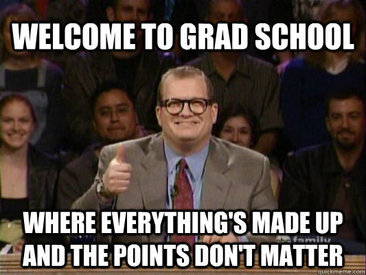When I was an earnest undergraduate, I thought all of my professors would be so happy to hear I was planning on going to graduate school immediately. But, um, no.
Example 1:
I was waiting in my History professor's office to discuss a paper when he came rushing down the hall, struggling with stacks of paper, and grumbling: "Don't go into academia. It's a nightmare."
I timidly replied, "Oh, well, actually - I am applying to go to grad school right after I graduate."
He said, "Forget your paper. Do you have time to get a cup of coffee? We need to talk about this."
By the end I had him convinced I knew what I wanted and he went on to mentor me through the applications process.
Example 2:
My Russian Literature professor, who had a reputation for being a bit (a LOT) eccentric, had me in his office at the beginning of my senior year. "Any plans for next year?" he asked distractedly.
I told him I was applying for History graduate programs.
"WHAT??!!!" He squawked. "Listen to me. LISTEN TO ME. Are you SURE you want to do this?"
I summarized my goals and reasons.
"Very well. I believe you can do it and so I will help you," he decided. "But know this - for the first year, you will hate your life."
I laughed nervously at his joke.
"I'M NOT JOKING!" he thundered. "You will hate it. HATE IT. You'll want to kill yourself. Where I went to school, students did kill themselves. Just jumped into the gorge rather than go back to class. Mark my words - you will write to me in a year and say, Professor, you were right."
Example 1:
I was waiting in my History professor's office to discuss a paper when he came rushing down the hall, struggling with stacks of paper, and grumbling: "Don't go into academia. It's a nightmare."
I timidly replied, "Oh, well, actually - I am applying to go to grad school right after I graduate."
He said, "Forget your paper. Do you have time to get a cup of coffee? We need to talk about this."
By the end I had him convinced I knew what I wanted and he went on to mentor me through the applications process.
Example 2:
My Russian Literature professor, who had a reputation for being a bit (a LOT) eccentric, had me in his office at the beginning of my senior year. "Any plans for next year?" he asked distractedly.
I told him I was applying for History graduate programs.
"WHAT??!!!" He squawked. "Listen to me. LISTEN TO ME. Are you SURE you want to do this?"
I summarized my goals and reasons.
"Very well. I believe you can do it and so I will help you," he decided. "But know this - for the first year, you will hate your life."
I laughed nervously at his joke.
"I'M NOT JOKING!" he thundered. "You will hate it. HATE IT. You'll want to kill yourself. Where I went to school, students did kill themselves. Just jumped into the gorge rather than go back to class. Mark my words - you will write to me in a year and say, Professor, you were right."
It took me a while to realize what these professors were doing. They were helping me manage my expectations about what graduate school entailed and making sure I understood why I was going immediately after wrapping up my undergraduate program.
The following fall I started my master's in a rigorous Russian Studies program at Harvard. During my first year, I learned the following lessons:
The following fall I started my master's in a rigorous Russian Studies program at Harvard. During my first year, I learned the following lessons:
1. You Probably Will Hate Your Life
A lot depends on your personality and how much of a life you have outside of your work, but if you're like me, and school is your sole focus, you will be jarred by how much emphasis is placed on grad students to be working ALL OF THE TIME.
The work-play balance nurtured by universities for undergraduates is no longer applicable. If you talk about taking a vacation over a long weekend or binge-watching your favorite TV show, professors will remark they don't know how you have the time. You are supposed to feel guilty about this.
Don't worry - by the second year (or second semester, if you're in a one-year program), you hit your stride, work seems more manageable, and you learn that the people who claim to be working around the clock are totally lying.
The work-play balance nurtured by universities for undergraduates is no longer applicable. If you talk about taking a vacation over a long weekend or binge-watching your favorite TV show, professors will remark they don't know how you have the time. You are supposed to feel guilty about this.
Don't worry - by the second year (or second semester, if you're in a one-year program), you hit your stride, work seems more manageable, and you learn that the people who claim to be working around the clock are totally lying.
2. You Will Feel Isolated From Other Students
Some grad programs inspire great camaraderie in its students, but even then, so much of your work requires solo research and writing. You can make an effort to study with someone, but you might find it easier to get your work done and make plans to hang out later.
If you are in classes with some undergraduate students, they might outnumber you. And even though you aren't ancient, boy will you feel OLD. It's easy to exclude the grad student because their world is no longer your world. That being said, you will also have plenty of seminars where the odd undergrad or two is the exception.
And dating will be weird. You can, but it's a bit tricky to draw from the undergrad population unless you started dating when you were both undergraduates. And gosh, no, you cannot date your professors or instructors. The pool of available students is limited to other graduate students who are frequently already in committed relationships or, you know, working all of the time.
If you are in classes with some undergraduate students, they might outnumber you. And even though you aren't ancient, boy will you feel OLD. It's easy to exclude the grad student because their world is no longer your world. That being said, you will also have plenty of seminars where the odd undergrad or two is the exception.
And dating will be weird. You can, but it's a bit tricky to draw from the undergrad population unless you started dating when you were both undergraduates. And gosh, no, you cannot date your professors or instructors. The pool of available students is limited to other graduate students who are frequently already in committed relationships or, you know, working all of the time.
3. It's Your Job - But Not Everyone Will Get That
I always tell undergraduates to treat college like a job, but in the case of grad school, it really is your job.
Except a lot of people don't know what that means, and assume you're still playing frisbee on the quad while they're stuck in an office from 9-5.
Nope, grad school hours are like being on call 24 / 7, where you're never really "done" because you're expected to build seminar papers into conference presentations into journal articles into first books into a special niche of expertise that could possibly win you a tenure-track position.
Except a lot of people don't know what that means, and assume you're still playing frisbee on the quad while they're stuck in an office from 9-5.
Nope, grad school hours are like being on call 24 / 7, where you're never really "done" because you're expected to build seminar papers into conference presentations into journal articles into first books into a special niche of expertise that could possibly win you a tenure-track position.
4. You Will Be Really, Really Poor
With my PhD program, the official rule was if you were receiving a stipend, this was supposed to be your only source of income and you were not allowed to take on outside work.
Unofficially, that rule was ri-freaking-diculous.
Do you know how much I made a year BEFORE TAXES?
$11,000.
So yeah, I took on a job or two so I could pay the bills.
I had a roof over my head, a (carefully budgeted) food supply, and a car to get to and from campus, but believe me, there was zero room for indulgences. For years.
I don't regret it though - I learned a lot about how to budget, distinguish between wants and needs, and make do without.
That being said, it's really nice to walk into a grocery store and buy grapes again, without considering them a once-a-month luxury.
Unofficially, that rule was ri-freaking-diculous.
Do you know how much I made a year BEFORE TAXES?
$11,000.
So yeah, I took on a job or two so I could pay the bills.
I had a roof over my head, a (carefully budgeted) food supply, and a car to get to and from campus, but believe me, there was zero room for indulgences. For years.
I don't regret it though - I learned a lot about how to budget, distinguish between wants and needs, and make do without.
That being said, it's really nice to walk into a grocery store and buy grapes again, without considering them a once-a-month luxury.
5. Strange Dress Conventions For Students
Sure, you can wear your normal clothes. But if you are in any position of authority to undergraduates, as either a T.A. or instructor, you might want to take measures to dress in a way that sets you apart from them.
I was only a couple of years older than some of the students I worked with, so I tried to dress more formally when I was around them.
And conferences are a minefield. A lot of grad students (rightfully) see conferences as a sort of job interview, but this is one time you don't want to wear a suit. Not only does it scream "GRAD STUDENT!", but also, look around. None of the scholars are wearing a suit and tie.
It's even more complicated for women. Dress too nicely, or bother with too much with makeup, and people wonder how a serious scholar can be focused on her work when she's obviously more interested in lipstick and curling her hair.
But don't dress nicely enough, and people wonder who's the frump.
I was only a couple of years older than some of the students I worked with, so I tried to dress more formally when I was around them.
And conferences are a minefield. A lot of grad students (rightfully) see conferences as a sort of job interview, but this is one time you don't want to wear a suit. Not only does it scream "GRAD STUDENT!", but also, look around. None of the scholars are wearing a suit and tie.
It's even more complicated for women. Dress too nicely, or bother with too much with makeup, and people wonder how a serious scholar can be focused on her work when she's obviously more interested in lipstick and curling her hair.
But don't dress nicely enough, and people wonder who's the frump.
6. It's Not Complete Academic Independence
Sorry, friend, but just because graduate school emphasizes a student's maturation into a scholar doesn't mean you won't still have to take tests, quizzes, exams, and write papers on topic you don't give two shakes about.
Sometimes your instructor or advisor will try to impress their research interests on you. Consider this a red flag. While you want to work with someone whose interests intersect with your own, you should not be pressured into doing a topic you don't feel a personal connection with. And be wary of profs who seem to give you paper ideas that conveniently also serve as research for their own projects.
Sometimes your instructor or advisor will try to impress their research interests on you. Consider this a red flag. While you want to work with someone whose interests intersect with your own, you should not be pressured into doing a topic you don't feel a personal connection with. And be wary of profs who seem to give you paper ideas that conveniently also serve as research for their own projects.
7. NOT EVERY FACULTY MEMBER WILL LIKE YOU, BUT THE ONES WHO DO, REALLY DO
It doesn't matter how likable, hard-working, conscientious, or motivated you are. Some professors will take issue with you. While I typically had good relationships with my instructors, not everyone thought I was a magical unicorn student.
In my master's program, one language instructor was so wholly convinced of my linguistic incompetence, he just sort of gave up on me and started giving me B's on everything (which at Harvard was akin to a D).
In my PhD program, one professor thought my research interests were not only untenable, but also, silly. And she went out of her way to tell not only me, but also, MY ADVISOR, that she thought so.
But you know what? My advisor went out of her way to tell me to ignore this professor, that she liked my ideas, and supported my project.
Which brings me to my ultimate point - yeah, you'll have professors with some kind of weird vendetta against you, or maybe life in general, but you'll also find someone who will become your mentor and cheerleader. Trust their opinion and just try to endure the others while you have to.
Advisor dynamics are everything. You have to be comfortable sharing your work with them, being critiqued by them, and letting them know when something personal is interfering with your work. If at all possible, make a concerted effort to get to know your advisor by reputation prior to arriving and in-person during your first year.
In my master's program, one language instructor was so wholly convinced of my linguistic incompetence, he just sort of gave up on me and started giving me B's on everything (which at Harvard was akin to a D).
In my PhD program, one professor thought my research interests were not only untenable, but also, silly. And she went out of her way to tell not only me, but also, MY ADVISOR, that she thought so.
But you know what? My advisor went out of her way to tell me to ignore this professor, that she liked my ideas, and supported my project.
Which brings me to my ultimate point - yeah, you'll have professors with some kind of weird vendetta against you, or maybe life in general, but you'll also find someone who will become your mentor and cheerleader. Trust their opinion and just try to endure the others while you have to.
Advisor dynamics are everything. You have to be comfortable sharing your work with them, being critiqued by them, and letting them know when something personal is interfering with your work. If at all possible, make a concerted effort to get to know your advisor by reputation prior to arriving and in-person during your first year.
After my first year, I sent my Russian professor an email:
You were right, I told him, The first year of grad school was the worst year of my life.
And it was. It really was. However, the second year was a marked improvement, and after getting my master's I continued on to a PhD program.
In his reply he chirped:
Of course I was right. It's horrible. And then it gets better. So proud of you. Good luck.
You were right, I told him, The first year of grad school was the worst year of my life.
And it was. It really was. However, the second year was a marked improvement, and after getting my master's I continued on to a PhD program.
In his reply he chirped:
Of course I was right. It's horrible. And then it gets better. So proud of you. Good luck.





